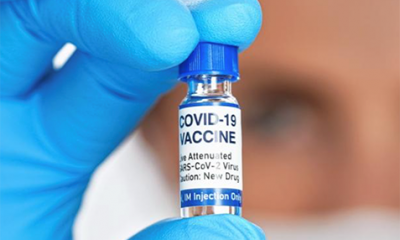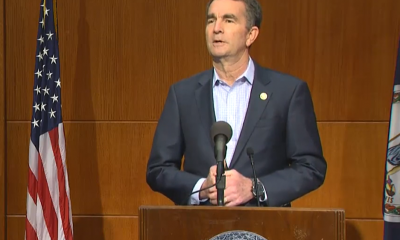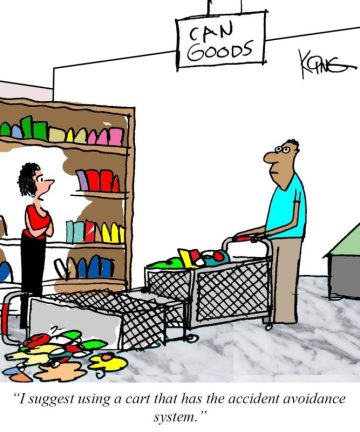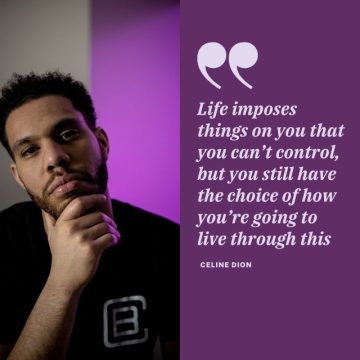State News
Governor Northam announces launch of 2019 Governor’s Fellows Program
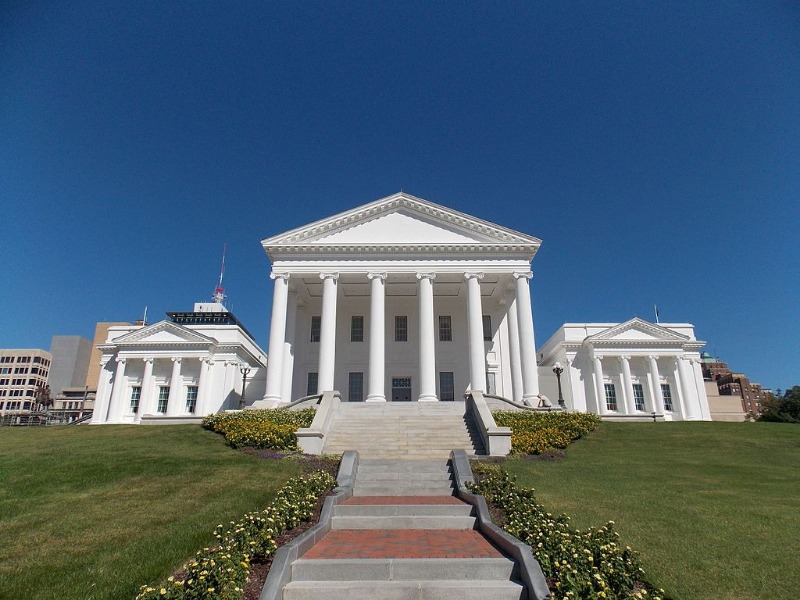
RICHMOND — Governor Northam today announced that applications are now being accepted for the 2019 Governor’s Fellows Program. Since 1982, the Governor’s Fellows Program has offered young Virginians firsthand state government experience at the highest level of the executive branch. Each fellow is placed with a member of the Governor’s Cabinet or with a member of his personal staff, providing an unparalleled opportunity to learn about the work and decision-making in the Office of the Governor.
“Each summer, the Governor’s Fellows Program gives participants a unique glimpse into the administration of state government and an opportunity to gain practical experience that they can carry forward,” said Governor Northam. “Not only do these exceptional young students represent the next generation of Virginia leaders, they bring new energy and valuable perspectives to our office.”
“The Governor’s Fellows Program is a rare experience, and for me was once in a lifetime,” said Cainan Townsend, a Prince Edward School Board member and a 2016 Governor’s Fellow under the McAuliffe administration. “It was an opportunity to gain exposure to our state government from interactions with, cabinet secretaries, state agencies, to the Governor himself. I credit much of my success to my participation in the program.”
In addition, Governor’s fellows learn from special guest speakers from the administration and go on site visits to state government agencies.
Qualified applicants must be rising college seniors, graduating seniors, or graduate students. All Virginia college and university students are eligible to apply, regardless of state of residence. Virginia residents who attend out-of-state colleges and universities are also eligible. Both public and private college and university students are encouraged to apply.
The selection of Fellows is based solely on merit. The Fellows Program does not discriminate on the basis of race, sex, color, national origin, religion, sexual orientation, gender identity, age, political affiliation, disability, or veteran status.
The deadline to apply for the Governor’s Fellows Program is Friday, March 15, 2019. The program directors will hold interviews between March 20, 2019 and April 6, 2019 and will advise on decisions by April 11, 2019. The program runs from Monday, June 3, 2019 to Wednesday, July 31, 2019.
To apply, visit the Governor’s Fellows Program website and send the required recommendation letters and transcripts to the address below:
Governor’s Fellows Program
Post Office Box 2454
Richmond, Virginia 23219
State News
Virginia Attorney General Joins Efforts to Fight Back Against Title IX Changes
Virginia Attorney General Jason Miyares has joined a multi-state effort to stop new Title IX rules from going into effect.
The list of new rules designed to protect victims of campus sexual assaults and the rights of LGBTQ+ students has come under attack by Republican attorneys general in several states.
Miyares called the changes a “dangerous overhaul” of Title IX and said the new rules would negatively impact students, families, and schools in the Commonwealth. The ruling also comes after Gov. Glenn Youngkin’s administration overhauled the commonwealth’s transgender student policies.
“The Biden Administration’s unlawful rule would jeopardize half a century of landmark protections for women, forcing the administration’s social agenda onto the states by holding federal funding hostage,” Miyares said in a statement. “They are avoiding Congress and the constitutional process because they know it will not pass. We cannot roll back Title IX in the name of false equity.”

Virginia Attorney General Jason Miyares at the Virginia State Capitol on Jan. 10. (Nathaniel Cline/Virginia Mercury)
Attorney generals from Tennessee, Indiana, Kentucky, Ohio, and West Virginia have also signed onto the suit, which was filed in Tennessee. Separate lawsuits have been filed in other states, including Louisiana and Texas.
Title IX, which has undergone several transformations based on the political party in office, was created to address women’s rights and prohibits any federally funded school or education program from discriminating against any student based on sex since it was established in 1972.
The Department of Education said some differences compared to the previous version developed under the Trump administration, include protections against all sex-based harassment and discrimination, prohibits schools from sharing personal information and supports students and families.
Narissa Rahaman, executive director for Equality Virginia, said in a statement that the rule prevents opponents from weakening “crucial” civil rights protections, including for LGBTQ+ students, by ensuring that pregnant and parenting students have a right to equal education opportunities, protecting student survivors and guaranteeing the rights of LGBTQ+ students to come to school as themselves without fear of harassment or discrimination.
“Students across races, places, and genders prove every day that they can do great things, especially when there are strong Title IX protections in place, which is why the Biden Administration’s updates to the Title IX rules are essential to ensure every student can thrive at school,” said Rahaman.
The new rule is slated to take effect on Aug. 1 and will apply to complaints of alleged conduct that occurs on or after that date, according to the Department of Education.
Protections
While the ruling protects students and employees from all sex-based harassment and discrimination, it will also impact LGBTQ+ students and employees, including providing complete protection from sex-based harassment and prohibiting schools from sharing personal information.
Schools must act “promptly and effectively” to protect and treat all students and staff who make complaints “equitably.” Schools must also provide support measures to complainants and respondents, and act to end any sex discrimination in their programs and prevent any recurrence.
The rule further clarifies the definition of “sex-based harassment,” which means to treat someone unfairly because of their gender; and the scope of sex discrimination, including schools’ obligations not to discriminate based on sex stereotypes, sex characteristics, pregnancy or related conditions, sexual orientation, and gender identity.
The federal agency said the changes will empower and support students and families by requiring schools to disclose their nondiscrimination policies and procedures to all students, employees, and other participants in their education programs so that students and families understand their rights.
The final rule also protects against retaliation for students, employees, and others who exercise their Title IX rights, and supports the rights of parents and guardians to act on behalf of their elementary school and secondary school children.
The rule also protects student privacy by prohibiting schools from disclosing personally identifiable information with limited exceptions, which is something the Youngkin administration has opposed.
Advocates say one of the rights students should have is the power to decide who finds out about their transgender status, to protect them from being bullied or harassed.
Virginia policies
In 2021, the first model policies for transgender students were designed under former Gov. Ralph Northam to provide school officials guidance on the treatment of transgender and nonbinary students and to protect the privacy and rights of these students.
However, some schools declined to adopt the model policies, and the state law that led to them lacked enforcement incentives or penalties.
The current policies adopted by the Youngkin administration were revised to require parental approval for any changes to students’ “names, nicknames, and/or pronouns,” direct schools to keep parents “informed about their children’s well-being” and require that student participation in activities and athletics and use of bathrooms be based on sex, “except to the extent that federal law otherwise requires.”
Virginia schools have also not fully adopted the newly revised policies, and state law has not changed since the policies were overhauled in 2023.
The Virginia Department of Education faces two lawsuits over the policies adopted by the Youngkin administration.
“All Virginia students, including our transgender and non-binary students deserve to feel safe and welcomed at schools,” said Wyatt Rolla, a senior transgender rights attorney with the ACLU of Virginia. “Accessing restrooms, locker rooms and other facilities that are necessary when you are at school learning is a key part of our schools being inclusive of those transgender [and] non binary students that are part of our community.”
Athletics not included
The provisions under the new Title IX rule did not mention anything about requiring schools to allow transgender students to play on teams that align with their gender identity. Virginia has taken its own shot at banning transgender athletes from competing in sports through legislation.
In February, the Youngkin administration attempted to challenge the Virginia High School League’s policy on transgender athletes, the Daily Progress reported.
The proposed policy would have matched with the administration’s current policies that students should be placed on teams based on their biological sex rather than their gender identity.
The Virginia High School League, which oversees interscholastic athletic competition for Virginia’s public high schools, allows for transgender athletes to participate on teams that match their gender identity, but under certain conditions.
Simultaneously, lawmakers in the Virginia General Assembly controlled by Democrats killed bills, including Senate Bill 68, during the previous session that would have essentially banned transgender students from competing in sports.
Sen. Tammy Brankley Mulchi, R-Mecklenburg, who carried Senate Bill 723, said students like her 6-year-old granddaughter should have a choice to play with their own gender during a Feb. 1 Senate Education subcommittee hearing.
Mulchi’s bill would have required schools and colleges to have separate sports for boys and girls based on their biological sex. Any dispute would require a note from a doctor.
“If she [my granddaughter] wants to play an all-girl sport, I want her to play against girls that were born girls and not play against someone that is much stronger than her or can hurt her and take away her chances of a scholarship,” Mulchi said.
However, Sen. Stella Pekarsky, D-Fairfax, argued during the February hearing that whether students are competing with their respective biological sex or not “children of all ages, sexes have different builds and strengths and no children are alike on the same team.”
by Nathaniel Cline, Virginia Mercury
Virginia Mercury is part of States Newsroom, a nonprofit news network supported by grants and a coalition of donors as a 501c(3) public charity. Virginia Mercury maintains editorial independence. Contact Editor Samantha Willis for questions: info@virginiamercury.com. Follow Virginia Mercury on Facebook and Twitter.
State News
Bill Banning Certain Driveway, Pavement Sealants to Take Effect This July
After attempting to ban the products in previous sessions, the Democratic legislature passed a bill Republican Gov. Glenn Younkgin signed that bans the sale of pavement sealant containing a set of chemicals environmental groups say seep into the environment, causing health issues for wildlife and humans. The ban begins July 1.
House Bill 985 prohibits the sale of the sealant used for driveways and parking lots that use certain concentrations of Polycyclic Aromatic Hydrocarbons, or PAHs, chemicals commonly found in coal tar.
“PAHs are definitely toxic. There isn’t a question about that,” said Joe Wood, senior scientist with the Chesapeake Bay Foundation, a major backer of the bill. “When organisms — whether oysters, mice, or fish — are exposed to these products in research studies, they have caused negative health effects.”
But groups that use the pavement sealers, primarily the Pavement Coating Technology Council, pushed back against the bill during the session, saying they shouldn’t be stopped from using the PAH-heavy sealants because other sources of the chemicals release them into the environment.
“We’re concerned that small businesses across Virginia will get snarled by these violations and penalties and not have anywhere to turn to remedy that situation,” said Alex Thorup, a lobbyist on behalf of the PCTC.
Other sealers felt differently. Michael Jones, owner of Jones Striping and Sealcoating LLC, said the PAH ban shouldn’t be a problem, given the health benefits his employees experienced after switching to an alternative material and that his company has still found work.
“We learned, of course, first hand, that [the coal tar] is toxic, and it does burn the skin also,” Jones said in a Feb. 27 committee testimony. “We [switched] because of the health of our clients’ employees and, of course, protecting the environment.”
The chemicals and how often they are used
The PAH chemicals naturally occur in coal, crude oil, and gasoline. The PAHs in pavement sealants come from coal tar, a byproduct of coking, or heating up coal to make it a higher quality.
The pavement sealant uses coal tar to fill cracks and provide a smooth finish on top of asphalt. From there, the pavement’s dust is kicked up into the air by the wind, washed away by stormwater runoff, or knocked loose from abrasive tires on roadways.
A study from the U.S. Geological Survey found that house dust in areas around where coal tar seal coating was used had a PAH concentration of 129 milligrams per kilogram. The seal coat itself had a PAH concentration of 66,000 milligrams per kilogram. Coal tar comprises about 20 to 35% of the product.
Conversely, non-coal tar sealants — such as asphalt emulsion, usually made up of asphalt water and soap — produced lower PAH concentrations in house dust, as little as 5 milligrams per kilogram. The asphalt emulsion product itself typically has concentrations of 50 milligrams per kilogram.
“Asphalt and asphalt-based seal coat products have much lower concentrations of PAHs,” USGS stated.
The environmental health harm
Several different research papers point to the chemicals causing harm to ecosystems, though some of the research is disputed.
The USGS research found that people living near coal tar sealants were 38 times more likely to have an “extra risk” of developing cancer than those living near unsealed pavement. In the Elizabeth River, the PAH chemicals from a nearby wood treatment plant were found to be a “plausible link” to cancer in killifish.
The presence of PAH from leaking petroleum storage tanks in Lewis Creek led the Department of Environmental Quality to create a total daily maximum load limit, or TMDL, in 2006 to reduce the amount of pollution runoff.
“With successful completion of implementation plans, Virginia will be well on the way to restoring impaired waters and enhancing the value of this important resource,” the TMDL plan stated.
However, the Pavement Coating Technology Council has pointed to errors in the USGS research, stating invalid modeling was used. The group also called out PAH pollution research done in Austin, Texas, which has waterways with more of a rock-based bottom that soil washes away from instead of East Coast waterways with dirt bottoms that collect soil over time.
The Austin research sampled soils in the waterway in 2005, 2008, and 2023 and didn’t find an accumulation of PAH chemicals, said Robert DeMott, a toxicologist with environmental engineering firm Ramboll, in a Feb. 27 committee testimony.
“We found that the ban did not yield a noticeable reduction in PAH levels across all of those creek systems,” said DeMott. “A narrowly targeted approach of focusing on only one source is unlikely to change the environment at large substantially.”
DEQ Director Michael Rolband added testimony on the bill saying the PAH chemicals are toxic, but linking their presence in the environment with pavement sealants was questionable.
A 2018 DEQ report summarizing research on the topic stated: “Land-use analyses have found that PAH concentrations do not correlate well with impervious surfaces if roadways are included. However, if roadways are separated out, PAH concentration correlates weakly with roadways and much more strongly with other types of impervious surface (i.e., parking lots).”
What the bill does
The bill creates a new section under the Environmental Emergency Response Fund statute, which is used for cleaning up environmental hazards.
Del. Kathy Tran, D-Fairfax County’s legislation sets a ban on selling pavement sealers with a PAH concentration of more than 1% of the product weight after July 1.
There’s also a provision that lets businesses in Virginia with the product in stock sell their inventory, but no one will be able to use it after July 1 of next year. Violations of the bans would result in a $250 penalty; those funds would then be deposited into the Environmental Emergency Response Fund.
The changes shouldn’t be a problem, Tran testified in committee testimony, considering that most large retailers selling gallon buckets of the sealant for homeowners to use on driveways are no longer doing so.
Jones, whose business deals with practical aspects of the product, including applying it to the ground, added compliance shouldn’t pose a challenge, considering his business transitioned away from the coal tar product years ago.
The change may have resulted in a 5 to 10% cost increase for him. However, his company’s portfolio of smaller projects is still active, evidenced by a 450-square-foot parking lot he recently did in downtown Richmond, which used 350 gallons of low-PAH sealant for the job.
“The quality is the same if not better,” Jones said, adding that his work is “a drop in the bucket” compared to the size and number of projects in the rest of the state.
National sealant distributors, like SealMaster, which has several locations in Virginia, have endorsed the pivot away from coal tar sealants with higher PAH concentrations in favor of “environmentally friendly” sealers.
For Jones, the health and safety of his workers outweigh any cost increases from the alternative sealants he uses now.
“They were coming [to work], but they weren’t as happy,” Jones said of his employees who may have been injured by coal tar sealant and previously had to wear long sleeves and facemasks in the outdoor heat as a precaution.
This story was updated to correct that the year DEQ’s report came out was 2018 and the concentrations of PAH in a coal tar sealant product.
by Charlie Paullin, Virginia Mercury
Virginia Mercury is part of States Newsroom, a nonprofit news network supported by grants and a coalition of donors as a 501c(3) public charity. Virginia Mercury maintains editorial independence. Contact Editor Samantha Willis for questions: info@virginiamercury.com. Follow Virginia Mercury on Facebook and Twitter.
State News
New EPA Rules Will Force Fossil Fuel Power Plants to Cut Pollution
On Thursday, the U.S. Environmental Protection Agency released a sweeping set of rules aimed at cutting air, water, and land pollution from fossil fuel-fired power plants.
Environmental and clean energy groups celebrated the announcement as long overdue, particularly for coal-burning power plants, which have saddled hundreds of communities across the country with dirty air and hundreds of millions of tons of toxic coal ash waste. The ash has leached a host of toxins — including arsenic, mercury, lead, cadmium, radium, and other pollutants — into ground and surface water.

AES Indiana’s Petersburg Generating Station in Petersburg, Indiana, has been burning coal since the 1960s but will shutter all of its coal-firing units over the next few years. On Thursday, the U.S. Environmental Protection Agency released a sweeping set of rules aimed at cutting air, water, and land pollution from fossil fuel-fired power plants. (Robert Zullo/States Newsroom)
“Today is the culmination of years of advocacy for common-sense safeguards that will have a direct impact on communities long forced to suffer in the shadow of the dirtiest power plants in the country,” said Ben Jealous, executive director of the Sierra Club, one of the nation’s oldest and largest environmental organizations. “It is also a major step forward in our movement’s fight to decarbonize the electric sector and help avoid the worst impacts of climate change.”
However, some electric industry and pro-coal organizations blasted the rules as a threat to jobs and electric reliability at a time when power demands are surging. They also criticized the rule’s reliance on largely unproven carbon capture technologies.
America’s Power, a trade organization for the nation’s fleet of about 400 coal power plants across 42 states, called the number of new rules “unprecedented,” singling out the new emissions standards that will force existing coal plants to cut their carbon emissions by 90% by 2032 if they intend to keep running past 2039. Michelle Bloodworth, the group’s president and CEO, called the rule “an extreme and unlawful overreach that endangers America’s supply of dependable and affordable electricity.”
‘This forces that’
Many experts expect the regulations to be litigated, particularly the carbon rule, since the last time the EPA tried to restrict carbon emissions from power plants, a group of states led by West Virginia mounted a successful legal challenge that went to the U.S. Supreme Court.
But Julie McNamara, deputy policy director with the Union of Concerned Scientists, said the agency took great pains to conform the rule to the legal constraints outlined by the court.
“This rule is specifically responsive to that Supreme Court decision,” she said. “Which doesn’t mean that it won’t go to the courts but this is so carefully hewn to that decision that it should be robust.”
The four rules EPA released Thursday mainly target coal-fired power plants.
“By developing these standards in a clear, transparent, inclusive manner, EPA is cutting pollution while ensuring that power companies can make smart investments and continue to deliver reliable electricity for all Americans,” EPA Administrator Michael S. Regan said.
In some ways, they attach a framework to a sea change in electric generation that is already well underway, McNamara said.
Coal accounted for just 16% of U.S. electric generation in 2023, according to the U.S. Energy Information Administration. In 1990, by comparison, it comprised more than 54% of power generation. However, some states are more reliant on coal power than others.
In 2021, the most coal-dependent states were West Virginia, Missouri, Wyoming, and Kentucky, per a 2022 report by the EIA.
“This rulemaking adds structure to that transition,” McNamara said. “For those who have chosen not to assess the future use of their coal plants, this forces that.”
Heather O’Neill, president and CEO of the clean energy trade group Advanced Energy United, said the new regulations are a chance for utilities to embrace cheaper, cleaner and more reliable options for the electric grid.
“Instead of looking to build new gas plants or prolong the life of old coal plants, utilities should be taking advantage of the cheaper, cleaner, and more trusty tools in the toolbox,” she said.
The carbon rule
In 2009, the EPA concluded that greenhouse gas emissions “endanger our nation’s public health and welfare,” the agency wrote, adding that since that time, “the evidence of the harms posed by GHG emissions has only grown and Americans experience the destructive and worsening effects of climate change every day.”
The new carbon emissions regulation will apply to existing coal plants and new natural gas plants. Coal plants that plan to operate beyond 2039 will have to capture 90% of their carbon emissions by 2032. New gas plants are split into three categories based on their capacity factor, a measure of how much electricity is generated over a period of time relative to the maximum amount it could have produced. The plants that run the most (more than 40% capacity factor) will have to capture 90% of their carbon emissions by 2032. Existing gas plants will be regulated under a forthcoming rule that “more comprehensively addresses GHG emissions from this portion of the fleet,” the agency said.
Michelle Solomon, a senior policy analyst for Energy Innovation, an energy and climate policy think tank, predicts that most coal plants will close rather than install the costly technology to capture carbon emissions.
“Climate goals aside, the public health impacts of the rules in securing the retirement of coal-fired power plants is so important,” she said. Coal power in the U.S. has been increasingly pressured by cheaper gas and renewable generation and mounting environmental restrictions, but some grid operators have still been caught flat-footed by the pace of coal plant closures.
“I think the role of this rule, to provide that certainty about where we’re going, is so crucial to get the entities that have control over the rate of the transition to start to take action here,” she said. But the National Rural Electric Cooperative Association’s CEO, Jim Matheson, called the rules “unlawful, unrealistic and unachievable” noting that it relies on technology “that is not ready for prime time.”
And Todd Snitchler, president and CEO of the Electric Power Supply Association, a trade group for competitive power suppliers, called the rule “a painful example of aspirational policy outpacing physical and operational realities” because of its reliance on unproven carbon capture and hydrogen blending technologies to cut emissions.
A beefed-up Mercury and Air Toxic Standards rule
The EPA called the revision to the Mercury and Air Toxic Standards “the most significant update since MATS was first issued in February 2012.” It predicted the rule would cut emissions of mercury and other air pollutants like nickel, arsenic, lead, soot, sulfur dioxide, nitrogen oxide and others. It cuts the mercury limit by 70% for power plants fired by lignite coal, which is the lowest grade of coal and one of the dirtiest to burn for power generation.
For all coal plants, the emissions limit for toxic metals is reduced by 67%. The EPA says the rule will result in major cuts in releases of mercury and other hazardous metals, fine particulate matter, nitrogen oxides and carbon dioxide. The agency projects “$300 million in health benefits,” including reducing risks of heart attacks, cancer and developmental delays in children and $130 million in climate benefits.
Stronger wastewater discharge limits for power plants
Coal fired power plants use huge volumes of water, and when the wastewater is returned to lakes, rivers and streams it can be laden with mercury, arsenic and other metals as well as bromide, chloride and other pollution and contaminate drinking water and harm aquatic life.
The new rule is projected to cut about 670 million pounds of pollutants discharged in wastewater from coal plants per year. Plants that will cease coal combustion over the next decade can abide by less stringent rules.
“Power plants for far too long have been able to get away with treating our waterways like an open sewer,” said Thomas Cmar, a senior attorney at Earthjustice, a nonprofit environmental law organization, during a briefing on the new rules earlier this week.
Closing a coal ash loophole
Coal ash, what’s left after coal has been burned for power generation, is one of the nation’s largest waste streams. The 2015 EPA Coal Combustion Residuals rule were the first federal regulations for coal ash. But that rule left about half of the ash sitting at power plant sites and other locations — much of it in unlined disposal pits — unregulated because it did not apply to so-called “legacy impoundments” that were not being used to accept new ash.
“We’re going to see a long-awaited crackdown on coal ash pollution from America’s coal plants, and it’ll be a huge win for America’s health and water resources,” said Lisa Evans, a senior attorney with Earthjustice. “They are all likely leaking toxic chemicals like arsenic into groundwater and most contain levels of radioactivity that can be dangerous to human health.”
Groundwater monitoring data shows that the vast majority of ash ponds at coal plants are contaminating groundwater, said Abel Russ, a senior attorney with the Environmental Integrity Project. But under the old rule, Russ said, facilities could dodge cleanup requirements by blaming contamination on older ash dumps not covered by the regulation.
“This is a huge loophole,” Russ said. “You can’t restore groundwater quality if you’re only addressing half of the coal ash sources on site.”
However, several attorneys on the Earthjustice briefing said the new rules, which will require monitoring at clean up and hundreds of more ash sites, will only be as good as the enforcement.
“It’s meaningful only if these utilities obey the law. Unfortunately to date, many of them have not,” said Frank Holleman, a senior attorney with the Southern Environmental Law Center.
by Robert Zullo, Virginia Mercury
Virginia Mercury is part of States Newsroom, a nonprofit news network supported by grants and a coalition of donors as a 501c(3) public charity. Virginia Mercury maintains editorial independence. Contact Editor Samantha Willis for questions: info@virginiamercury.com. Follow Virginia Mercury on Facebook and Twitter.
State News
Number of Incarcerated Pregnant Women Increases Amid Opioid Epidemic
RICHMOND, Va. — Karlee Clements was six months pregnant, “full on into addiction,” and begging to go to jail because she was afraid she would kill her child.
Soon after, she was incarcerated at Riverside Regional Jail for a violation. Because of her baby’s low heart rate, she was sent to Chippenham Hospital, where she spent the remainder of her pregnancy.
Zip-tied to a hospital bed, with a Riverside officer next to her, Clements gave birth to a baby girl and spent three days with her, per Virginia law. Restraints are no longer allowed on inmates during labor, except under certain circumstances.
Clements went back to jail, and her baby experienced withdrawal for 30 days. Once she was released, Clements gave her baby up for adoption and started using drugs again.
“It became a way of living,” Clements said. “That’s the way I got through life.”
She went to rehab and stopped using heroin but began using methadone, a synthetic opioid often prescribed as part of recovery treatment and to combat withdrawal symptoms.
“Even though I love that baby, and I don’t want to hurt that baby, there’s just something inside of me where I can’t stop using,” Clements said.
The number of jailed pregnant women fighting addiction has increased amid the skyrocketing opioid use in the past decade that led Virginia to declare a public health emergency in 2016. While the state has started to fund more recovery and treatment efforts, incarcerated mothers have fewer resources. Women in jail say facing motherhood and addiction is a specific struggle that needs more attention, in addition to more uniform prenatal care.
There is no official census of how many pregnant women are incarcerated or their overall maternal health, a data gap the U.S. Department of Justice acknowledges and is addressing.
Approximately 3% of women admitted to U.S. jails are pregnant, according to a 2020 peer-reviewed study published in the Obstetrics & Gynecology journal. If that number was applied to the national jail population, there could be an estimated 55,000 pregnant women in jail.
Spike in Rates of Pregnant Women Using Opioids
Clements is now incarcerated at Chesterfield County Jail and involved in its recovery program, Helping Addicts Recover Progressively. She said security is the most beneficial thing she’s gotten out of HARP.
“I’m actually learning to love myself, and my feelings are coming back,” Clements said. “It’s okay to feel; I’m not used to feeling at all.”
The number of women with opioid-related diagnoses at the time of delivery increased by 131% between 2010-2017, according to a JAMA Network study. In Virginia, the number of infants exposed to a substance — including drugs and alcohol cases — rose 533% between 2000-2018, with a spike that also parallels the increased use of opioids.
Nearly 30% of females incarcerated at a state and federal level were charged with a drug offense, according to 2016 Bureau of Justice data, the most current available.
Almost half of incarcerated persons in the U.S. have a substance use disorder, according to the same 2016 data. And nearly half of state and federal inmates are parents of a minor.
Finding Recovery Behind Bars
Chesterfield County Sheriff Karl Leonard started the HARP program after annual overdose deaths in the county hit double digits on March 8, 2016.
People would get clean and sober in jail and then return to the community. In reality, nothing was being done to help them, Leonard said.
“We wanted to start releasing recovered addicts back into the community with the tools, the knowledge, the equipment to be able to deal with all those issues that led them to use drugs before they got into the jail,” Leonard said.
HARP currently does not offer programs geared towards pregnant women but does offer parenting classes.
The Chesterfield jail does not provide prenatal care, so pregnant inmates are sent to Riverside in Prince George's County. Riverside had 475 pregnant inmates in a little over eight years, according to the jail.
HARP predates the Opioid Abatement Authority, created by the General Assembly in 2021 to handle incoming opioid lawsuit settlement money. Virginia is beginning to receive millions of what will be an estimated $1.1 billion, according to the OAA.
“One of the rules for the use of the funds, which we disagree with very much, is that the funds cannot be used for any existing programs,” Leonard said.
According to its website, a locality cannot use OAA money to supplant existing expenditures but can receive funding if they expand existing programs or implement new programs.
Support for Incarcerated Pregnant Women
Many women do not even know they are pregnant when they enter jail, according to Henrico County West Jail Capt. Pamela Dismuke. Female inmates are required to take a pregnancy test when they enter.
“I like to say a lot of the time jail kinda saved them because had she not known she was pregnant, she’d probably still be doing drugs and hurting the baby even more,” Dismuke said.
Dismuke started a program for pregnant inmates two years ago. She contacted someone who works for the Department of Corrections and is a doula or a person who provides guidance and support to a pregnant woman during labor.
Incarcerated pregnant women need specific food, supplements, exercise, and even postpartum help that is not common practice throughout the system.
The nonprofit Virginia Prison Birth Project pairs pregnant women in the Henrico jail with a doula, shares nutritional food and information on a baby’s development and care, and a weekly yoga class. Doulas also offer support by delivering breastmilk to the baby’s caretaker.
According to its website, the organization provided the first doula-supported birth for a pregnant inmate in Virginia in 2019.
Many women learn through the program how drugs hurt their babies, and it helps them take better care of themselves, Dismuke said.
Bobbie Jo Lashway, a pregnant inmate at Henrico County West Jail, said there are few programs aimed at her subgroup despite large numbers of incarcerated pregnant women.
Lashway enjoys the yoga program and is thankful people take time out of their day to share experiences.
“It’s good on a human connection level that we don’t get in here,” Lashway said.
Funding Efforts to Combat the Epidemic
The OAA distributes 55% of incoming settlement funds to state agencies and localities that apply for funding, according to OAA Director of Finance Adam Rosatelli. A grants committee decides how to distribute the funds in line with opioid abatement efforts and the Virginia code.
The OAA has not funded any programs related to incarcerated pregnant or parenting women but has funded jail programs, according to Rosatelli.
“It was a pretty powerful thing to observe the work we do and how it is being put into action,” Rosatelli said about a visit last year to an OAA-funded recovery center for women in Washington County.
The OAA has distributed about $34 million, which has been used for initiatives such as recovery homes, education and prevention efforts, and marketing campaigns, according to Rosatelli.
Parental Drug Abuse a Top Cause of Child Home Removal
Henrico County received over $700,000 from the OAA to begin a treatment program for pregnant or parenting women with substance use disorders. The program will assist mothers and their children with housing costs, medical care, and behavioral health support.
Henrico also received $100,000 from the OAA to study gaps in service and resources for pregnant and nursing mothers in the region.
Neglect is the leading cause of a child’s removal from their home, followed by parental drug abuse. There was a 60% increase in children being removed from their homes due to parental drug abuse from 2010-2019, according to the Virginia Department of Social Services.
Over 1,600 kids were in foster care for this reason as of April 2024, according to VDSS data.
Clements has traveled a long road since she first stole pain pills from her mother. Now, she works through HARP to confront and heal the trauma that pushed her toward substance use. The program is helping her build back her self-esteem so that she can face continued challenges.
“This is literally the first time I’ve ever even said that story, but I’m able to say that without crying and feeling bad and feeling like it is my fault,” Clements said.
VCU InSight journalist Jimmy Sidney contributed to this report.
By Alyssa Hutton, Capital News Service
Video by Jimmy Sidney, VCU InSight
Capital News Service is a program of Virginia Commonwealth University’s Robertson School of Media and Culture. Students in the program provide state government coverage for a variety of media outlets in Virginia. VCU InSight is the capstone broadcast news program.
State News
Impact of Virginia Governor’s Veto of Recreational Cannabis Marketplace
Three years, four sessions, and one veto since the first legislative attempt, Virginia still does not have a recreational cannabis market. Potential investors say that makes it hard to plan for the future. Advocates and some politicians say the reasons the governor gave for his recent veto are only exacerbated by preventing recreational cannabis sales.
Gov. Glenn Youngkin recently vetoed House Bill 698 and Senate Bill 448, which would have created a framework for an adult-use, recreational cannabis market.
This session was not the first time the General Assembly acted to create a retail market. Lawmakers passed a bill in 2021, but the part of the bill that would create a recreational market had to also be passed the next year before it became law — which never happened. The part that did not need reenactment legalized simple possession of marijuana.
Republicans gained a House majority in 2022, along with a new governor who was uninterested in creating a cannabis market. Lawmakers skipped over the issue in 2023 and brought it back this year with a legislative Democratic majority.
Del. Paul Krizek, D-Fairfax, and Sen. Aaron Rouse, D-Virginia Beach, worked on a compromise between their two bills and expressed disappointment over the governor’s vetoes.
“Public servants are obligated to tackle pressing issues, regardless of their origin or culpability. They cannot cherry-pick which problems to address,” Rouse stated.
Youngkin is concerned the illegal market will thrive if a recreational market is established, but other lawmakers believe the lack of a legal market is driving up those numbers.
“States following this path have seen adverse effects on children’s and adolescent’s health and safety, increased gang activity and violent crime, significant deterioration in mental health, decreased road safety, and significant costs associated with retail marijuana that far exceed tax revenue,” Youngkin stated in his veto.
The better approach would be to revisit any discrepancies in enforcement, according to the governor.
“Governor Youngkin’s failure to act allows an already thriving illegal cannabis market to persist, fueling criminal activity and endangering our communities,” Krizek stated in an email. “This veto squandered a vital opportunity to safeguard Virginians and will only exacerbate the proliferation of illicit products.”
Rouse called the governor’s “dismissive stance” toward cannabis sales unacceptable.
The unregulated and untaxed illegal cultivation and distribution of cannabis generates at least over a billion dollars annually in Virginia, according to a 2020 Joint Legislative Audit and Review Commission, or JLARC, report.
As the law currently stands in Virginia, adults over 21 can legally use and possess cannabis for an amount up to 1 ounce. Green-thumb adults are allowed to cultivate four plants at home. Adults can also pay to get medical approval and purchase cannabis through state-approved dispensaries.
Advocates Disappointed, say Bill was Good
Chelsea Higgs Wise is the executive director of Marijuana Justice. She has tread the Capitol steps since 2019 to lobby and inform lawmakers. She testifies in committees about cannabis-related legislation, including equity measures and the modification of cannabis-related offenses.
The Black-led organization’s advocacy work includes a path forward for people who have been incarcerated on marijuana charges through repeal, repair, and rehabilitation. The organization also pushed for social equity programs that help formerly incarcerated people get into the legal cannabis business.
The legislation vetoed by the governor would have legalized it right, Higgs Wise said.
“It includes the equity portions, repair for communities, and certain funds,” she said. “This is what we've been promising Virginia.”
The excitement did not last long. A few weeks after the bill passed, it met the governor’s veto pen.
“It’s a grave disappointment that Virginia is going to have to wait for a safe and regulated cannabis market,” Higgs Wise said. “Gov. Youngkin’s obsession with the legacy market is misplaced, but we recognize the need for a regulated market for reinvesting our community.”
Marijuana Justice does not use the term black market and instead uses “legacy market.”
“The legacy market is thriving; we've always had a marijuana market here in Virginia and across the U.S.,” Higgs Wise said. “We don't need the government to tell us what that is. They're just coming in now to make a lot of money off of it.”
The Virginia Cannabis Equity Loan Fund would have provided grants and low-interest and zero-interest loans to qualified micro business applicants. The fund was called the social equity license in previous legislation, and Republicans attempted in 2022 to channel the money to other places and eliminate the qualifying provisions.
The micro business provisions were a way for people to get involved with what is anticipated to be a multimillion dollar business, including veterans of the U.S. armed forces as long as they met certain qualifications.
Illegal markets often still thrive in the first few years after a state legalizes cannabis sales. That has to do with equity provisions, or lack thereof, according to Higgs Wise.
“Their people that they know are not selling it, that means it is not in their neighborhood; it’s too expensive,” she said.
The familiar aspect of connecting with the local supplier, often a friend or someone from the community, also does not come with extra fees.
“These are the equity portions that we have to think about for the consumers as well as for the business owners,” Higgs Wise said.
The first year of the recreational market could see sales between $123 million to $206 million, according to JLARC estimates from the bill’s impact statement. By year five, sales were forecast to be between $609 million to just over $1 billion.
Lawmakers settled on an 8% marijuana tax, with sales and use tax at 1.1% percent. Localities had the option to tax up to 2.5%, and include a food and beverage tax.
Recreational marijuana sales could bring in $6.41 million in the first year from the 8% tax alone. By the fifth year, the tax revenue was forecast at $66.41 million.
The legal marijuana market would overtake the illegal market by year four and have nearly two-thirds of the sales by year five, even with much higher tax rates, JLARC reported in 2020.
JLARC looked at the reported cannabis use rates compared to the use rates of other states to determine this figure.
Higgs Wise said to “rest assured” her organization will be back next year to push for a recreational market.
“For those who want to participate in Virginia's cannabis industry, we welcome you to join us to fight for a fair and just market,” Higgs Wise said.
Impact on Virginia Cannabis Companies
Griffin Moon and Dave Bredard launched Chester Cannabis Co. two years ago to sell hemp products that were legal at the time and had hopes of getting into the cannabis market.
“So that’s definitely the biggest challenge for companies in this industry is all the changing legislation,” Moon said. “You just never know what’s coming.”
Currently, hemp products cannot contain more than 0.3% THC. Moon and Bredard disposed of a number of products after lawmakers cracked down on THC levels in hemp in 2022. Lawmakers sought more regulation of delta-8 sales, according to a report from the Virginia Mercury.
They had to go back to the lab and create a new product line, Moon said.
“It’s hard to kinda set up a business if you can only think of a year or a couple years in advance and set up, you know, five, 10 years down the line,” Moon said. “It's just hard to think of the future.”
Policy Standpoint
Gregory Habeeb, president of Gentry Locke Consulting, represents Virginia’s Cannabis Association. He served as a Republican delegate representing southwestern constituents from 2011-2018.
A roughly $3 billion illegal cannabis market already exists, Habeeb said.
“So the real issue is how we should regulate that market,” Habeeb said. “By passing a bill to regulate it, we can address the public health and safety concerns.”
The illegal market continues to grow, going untaxed, unregulated, with untested products sold, according to Habeeb.
“We’re hearing from law enforcement all over the state that they want something done, it’s time to get it done,” Habeeb said.
Polls continue to show that recreational cannabis is a bipartisan issue. A majority of Virginians support retail sales. Democrats have the most support (70%), followed by Independents (54%) and then Republicans (46%).
“Nobody wants a system where unlicensed drug dealers sell untested, untaxed products,” Habeeb said. “I think there’s going to be some political consequences, as more and more people come around to the idea that we need to regulate this market.”
VCU InSight reporter Mark Jones contributed to this report.
By Michael Chun, Capital News Service
Video by Mark Jones, VCU InSight
Capital News Service is a program of Virginia Commonwealth University's Robertson School of Media and Culture. Students in the program provide state government coverage for a variety of media outlets in Virginia. VCU InSight is the school’s broadcast capstone.
Local News
Virginia Opens Early Voting for June Primary Starting May 3
Early voting for the upcoming primary elections in Virginia is set to commence on May 3, 2024, allowing voters to cast their ballots well ahead of the official election day on June 18. Residents looking to vote early can do so in person at the general registrar’s office of the jurisdiction where they are registered. Voters are required to present a valid ID to participate.
Absentee voting is also an option for those unable to vote in person. Starting May 3, absentee ballots will be mailed out to those who have requested them, including military and overseas voters. Voters can request an absentee ballot online through the Citizen Portal, by mail, in person, or by contacting their local general registrar’s office. The deadline for requesting a mailed absentee ballot is set for June 7.
Additionally, Virginia will conduct dual primaries, meaning voters will decide whether to vote in the Democratic or Republican primaries. It’s important to note that voters can choose which primary to participate in, but they cannot vote in both. This does not affiliate a voter with any particular party, as Virginia does not register voters by party affiliation.
The last day to register to vote for this election is May 28. However, Virginia also offers same-day registration, allowing voters to register on the spot at an early voting location and cast a provisional ballot.
Electronic marking tools for absentee ballots are available for voters with specific needs, such as visual or manual dexterity impairments. There’s also curbside voting for individuals over 65 or those with disabilities.
Voters with questions about absentee or early in-person voting can call their general registrar’s office or the Department of Elections at 1-800-552-9745 or email info@elections.virginia.gov.





